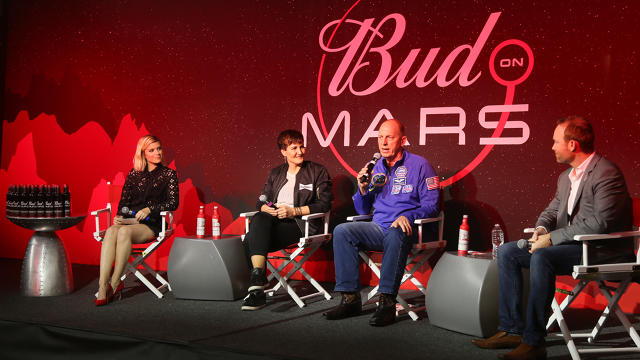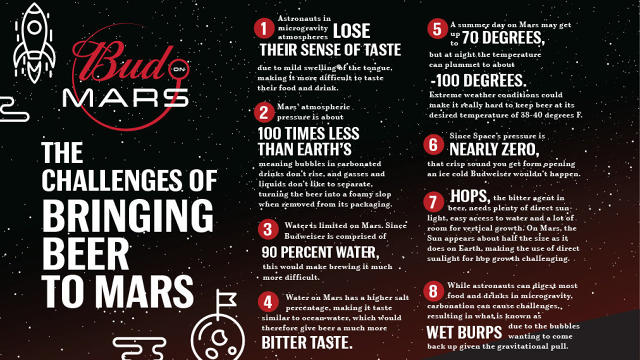In space, no one can hear you crack open a cold one. Astronauts have lamented this for years, but it's just basic science: carbonated beverages don't work so well in a zero-gravity environment. The pressure inside the container is different than the pressure outside the container, and things get messy. Without gravity, the bubbles in the drink aren't buoyant, so they don't float to the top. NASA experimented with soda back in the '80s (hey, man, who didn't?), but so far, no one has made it possible to drink anything in microgravity that doesn't come in a bag with a straw, like a Capri Sun.
On Saturday evening at SXSW, though, Budweiser announced plans to change all of that. At an official panel the brand hosted in downtown Austin, they recruited retired astronaut Clay Anderson, Anheuser-Busch vice president of innovation Valerie Toothman, and Center for the Advancement of Science in Space marketing & communications manager Patrick O'Neill (whose organization manages the U.S. lab at the International Space Station). To moderate the discussion, they hired Kate Mara—ostensibly because she was in The Martian—and, branding the event as Bud On Mars, announced their big plans to develop Space Beer.
The panel was very exciting for the Budweiser folks hosting it, who seemed well-versed in the problems that come with drinking beer in space. In order to drive that point home to an audience that has spent less time considering the physics of carbonation, they laid out the challenges mankind will face as it begins to develop beer for the humans who will eventually be visiting the Red Planet: In addition to the whole gravity thing, the lack of water will make brewing difficult, the lack of direct sunlight will make it difficult to grow hops, the carbonation causing a yucky-sounding problem known as "wet burps," and the fact that you can taste less food in space because your tongue swells. These are the challenges Budweiser announced that it's committed to solving.

On the one hand: All of this is very silly. On the other hand: Budweiser is taking it seriously, and anytime a company with an annual revenue of $15 billion announces that it intends to invest in space exploration in any capacity, it's worth paying attention to. If Budweiser wants to push mankind to Mars, that's not a tiny company doing some shoving, and the role of even unexpected, unconventional brands in the future of space exploration is worth considering.
The other actual benefit to this that's worth considering is that innovations that affect life on earth often come out of research done for space and microgravity exploration. That's something that O'Neill of CASIS stresses to Co.Create about the role of the ISS in this campaign. "For the national lab, we're always looking at how researchers can take advantage of microgravity environments to benefit life on earth," he says. "When we're working with Budweiser, the caveat is always 'How is the Earth benefitting?'"

There are a variety of researchers that CASIS works with who are using microgravity for far-flung experiments that would affect both life on the space station and here on the ground. The actual benefits to earthbound humanity from Budweiser's space beer research are unclear before experiments begin—"We don't know what we don't know," O'Neill says—but it's easy to imagine a future in which the way beer is bottled, or even brewed, is changed by what Budweiser learns from this endeavor.
For the actual astronauts, meanwhile, this would be a novel way to make space travel feel a little more like home—but not much more. "We have a lot of stuff that reminds you of home, but we don't have beer," says Anderson. "Would it totally change the experience? No. Would it make it better? Absolutely. If we had a holodeck, that would totally change the experience."
Quelle: fastcocreate
